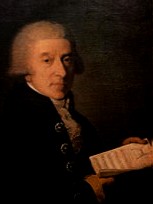

Italian composer. Sarti was born at Faenza on December 28th, 1729. He was educated by Valotti in Padua and Padre Martini, and appointed organist of the cathedral of Faenza before the completion of his nineteenth year. Resigning his appointment in 1750, Sarti devoted himself to the study of dramatic music, becoming director of the Faenza theatre in 1752. In 1751 he produced his first opera, Pompeo in Armenia, with great success. His next works, Il Re Pastore, Medonte, Demofoonie and L'Olimpiade, assured him so brilliant a reputation that in 1753 King Frederick V of Denmark invited him to Copenhagen, where he conducted Pietro Mingotti's opera company; he was later appointed Hofkapellmeister (1755), director of the Italian Opera, and director of court music (1763). In Copenhagen he produced his Ciro riconsosciuto. In 1765 he travelled to Italy to engage some new singers; meanwhile the death of King Frederick put an end for the time to his engagement. After three years in Italy, during which he was maestro di coro at the Pietà Conservatory in Venice (1766-67), in 1769 he went to London, where he could only contrive to exist by giving music lessons. In 1770 he obtained a post in Venice as music master at the Conservatorio dell Ospedaletto, but he returned to Copenhagen to direct the royal chapel and court theater (1770-75) and serve as the king's singing teacher. In 1775 he was dismissed as a result of political intrigues. In 1779 he was elected maestro di cappella at the cathedral of Milan, where he remained until 1784. After his appointment, his Le gelosie villane (1776) was successfully produced at La Scala in Milan, where he exercised his true vocation composing, in addition to at least twenty of his most successful operas, a vast quantity of sacred music for the cathedral, and educating a number of clever pupils, the most distinguished of whom was Cherubini. In 1784 Sarti was invited by the empress Catherine II to St Petersburg. On his way thither he stopped at Vienna, where the emperor Joseph II received him with marked favor, and where he made the acquaintance of Mozart. He reached St Petersburg in 1785, and at once took the direction of the opera, for which he composed many new pieces, besides some very striking sacred music, including a Te Deum for the victory of Ochakov, in which he introduced the firing of real cannon. He remained in Russia until 1801, when his health was so broken that he solicited permission to return. Tsar Alexander dismissed him In. 1802 with a liberal pension; letters of nobility had been granted to him by the Empress Catherine. His most successful operas in Russia were Armida e Rinaldo and Olega, for the latter of which the Empress herself wrote the libretto. Sarti died at Berlin on July 28th, 1802.
Sarti's opera I Due Litiganti has been immortalized by Mozart, who introduced an air from it into the supper scene in Don Giovanni. It should be noted that Mozart's Nozze di Figaro owed a great deal to the influence of this opera, which was performed in Vienna in 1784. The admirable libretto by Da Ponte, author of the libretti of Figaro and Don Giovanni, shows similar situations, and the complicated finale of the first act served as a model to Mozart for the finale of the last act of Figaro.